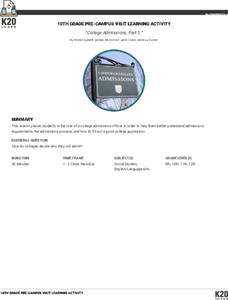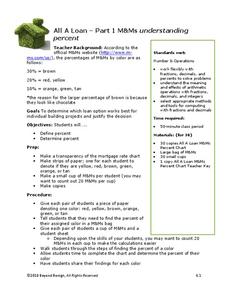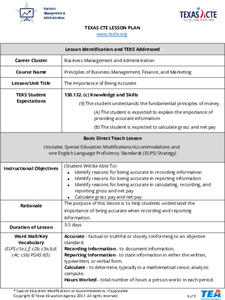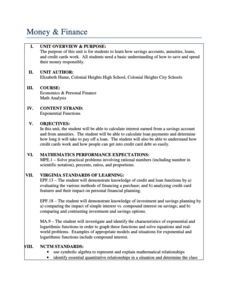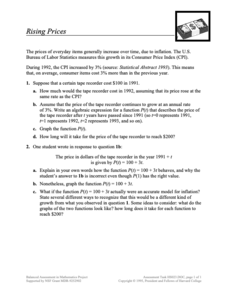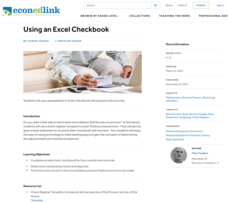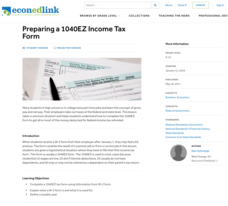Curated OER
By the Pound
Agriculture surrounds us every day; incorporate measuring tools into a study of Oklahoma's agricultural industry! Small groups read an informational text (included) before visiting stations where they investigate prices of various...
Curated OER
Money Math Lessons for Life
An outstanding lesson on financial literacy is here for you. Learners are presented with six scenarios, then compute the amount of savings they will have in their accounts. They complete a series of exercises designed to teach them that...
K20 Learn
What Is It to Be Financially Literate?
New ReviewWhat does it mean to be financially responsible? Develop a working definition of financial literacy with your classes. Using six scenarios, learners debate financially literate actions and develop a definition based on their decisions.
K20 LEARN
College Admissions, Part 1: 10th Grade Pre-Campus Visit Learning Activity
Scholars assume the role of admissions officers to better understand the college admissions process. They evaluate five fictional college applications and work together to determine which ones meet acceptance requirements.
Beyond Benign
Final Budget
Be sure you have enough money to build a house. The 14th lesson plan in a 15-part series teaches young learners to use checkbook registers. They write checks for the amounts they spend on various housing materials and keep track of...
Beyond Benign
Green House?
A solid foundation is important for all things—especially houses. Learners research different materials for foundations based on environmental impact and cost. They decide whether concrete, insulated concrete, or wood would be best for...
Beyond Benign
All A Loan
When designing a house, it's important to know about percents. Through a series of three lessons, scholars first review percentages through an activity involving M&Ms and then apply that knowledge to calculate compound interest and...
K20 LEARN
Identity Theft: Don't Let This Happen to Your Grandma!
Class members consider how people steal online identities as they discover the essential elements of identity theft and consumer fraud. Pupils demonstrate learning by creating a poster or video about how to avoid identity theft.
Texas Education Agency (TEA)
Importance of Being Accurate
Accuracy is key! Using the detailed resource, scholars practice their presicion skills, taking online spelling and typing tests. Next, they demonstrate accuracy by calculating the gross and net pay of five hypothetical employees.
California Department of Education
California CareerZone Make Money Choices Student Workbook
An activity challenges scholars to make smart money choices. While visiting the California CareerZone website, pupils choose between budgeting for one's lifestyle or salary and complete a two-page instructional activity based on the...
Texas Education Agency (TEA)
Piggy Bank vs. Bank – Choosing and Maintaining Your Account
Cha-ching! Using the practical resource, scholars investigate the different types of bank accounts and banking services available. Pupils view a PowerPoint, practice writing checks, and complete a checking account research project.
Texas Education Agency (TEA)
Credit Scores and Your Financial Future
How important is a credit score, anyway? Scholars view a PowerPoint and take notes about credit scores. Next, they write essays explaining their plans for achieving a good credit score.
Texas Education Agency (TEA)
Identity Theft and Credit Safety
Deter, detect, defect. Pupils watch a PowerPoint presentation and video about identity theft and credit card safety, taking notes to use later. Next, they develop a plan for maintaining credit safety and write an essay about the topic.
US Department of Commerce
Where to Next?
Salary, education, census statistics ... how do people choose their careers? Scholars complete worksheets and rely on census data to determine their career aspirations. Then, pupils conduct Internet research about places they would...
Radford University
Money and Finance
Make the connection between money and exponential equations. Pupils continue financial lessons as they learn about compound interest in savings accounts. They extend the investigation of savings by looking at annuities, and then...
Radford University
Percentages: Lessons 2 and 3
What does salary have to do with it? Working in small groups, scholars use percentages to find simple interest and the value of a car they can afford on a given salary. Learners continue on to work with salaries and calculate amounts...
Concord Consortium
Rule of 72
Find an easier way to double it. Using the price of an item and the Consumer Price Index, learners determine how long it will be for the price to double. Scholars calculate the length of time it would take for the price to double using a...
Concord Consortium
Rising Prices
What will that cost in the future? The scenario provides pupils with a growth as a Consumer Price Index. Learners create functions for a given item to determine future prices and graph them. Class members then compare their functions to...
Council for Economic Education
Calculating Simple Interest
How much is owed? A calculated resource introduces the simple interest formula with a video that describes how to use it. Classmates then show what they know by answering questions within a simple interest worksheet.
Concord Consortium
It's In the Mail
It's time to check the mail! The task is to determine the most cost-effective way to mail a packet of information. Young scholars write an equation that models the amount of postage as a function of the number of sheets mailed and...
Council for Economic Education
Understanding a Balance Sheet
Read any financial website or book, and it is bound to discuss the words asset and liability. But what do these words actually mean to the class? The resource effectively explains by using multiple formats and techniques, including...
Council for Economic Education
Using an Excel Checkbook
High school is the time that many scholars get their first jobs. Help young entrepreneurs apply economic principles to crucial skills for their new jobs and for functioning in society in general. They use Excel to balance a checkbook by...
Council for Economic Education
Preparing a 1040EZ Income Tax Form
Some of us never feel like we know how to do our taxes! Help scholars understand the process early by using an informative resource. They fill out their own tax forms in a simulation activity and view multiple resources to learn even...
PBS
Estimating Profit from a Job
Profit always seems to get everyone's attention. The same is true during a activity on estimation. Learners use given information to estimate the cost of supplies for a painting job. They then develop a strategy for estimating the profit...





